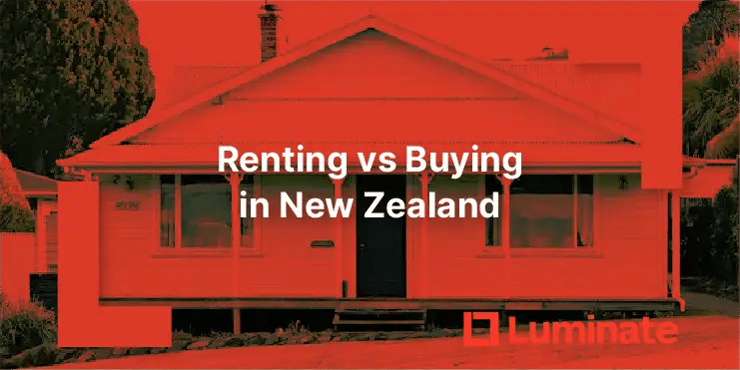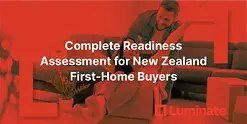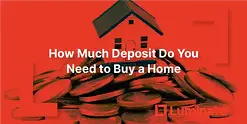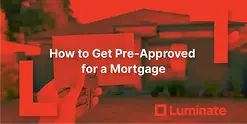Renting vs Buying in NZ: Guide for First-Home Buyers 2025
 By
Trent Bradley
·
14 minute read
By
Trent Bradley
·
14 minute read

For many Kiwis, the dream of homeownership starts with a simple question: should I keep renting, or is it time to buy my first home? With rising living costs, tighter lending rules, and a constantly shifting property market, this decision can feel more complicated than ever.
Table of Contents
- Understanding the Renting vs Buying Decision Framework
- Renting: Benefits, Costs, and When It Makes Sense
- Buying: Benefits, Costs, and Building Long-Term Wealth
- The Emotional and Lifestyle Factors
- Common Myths and Misconceptions
- How to Make Your Decision: A Practical Framework
- How Luminate Helps You Make the Right Choice
- Frequently Asked Questions About Renting vs Buying
- Take the Next Step: Get Clarity on Your Situation
Key Takeaways
- The renting vs. buying decision isn't just about money—it requires scoring yourself across three critical factors: financial readiness (deposit, income, debts), life stage stability (career, location, relationship), and homeownership goals (wealth building, control, flexibility).
- Renting makes strategic sense when you're building deposit savings, facing career uncertainty, early in your earning career, or have unclear relationship/family plans—but should be done purposefully with clear savings goals, not indefinitely.
- After 30 years, buying typically creates $1,180,000+ more wealth than renting the same property—homeowners have a $2.1M paid-off asset while renters have $920,000 in investments but still pay $1,200+/week rent in retirement.
- Buying breaks even within 3-5 years and delivers clear financial advantages beyond that point, with every mortgage payment building equity while rent payments build nothing—plus you benefit from property appreciation averaging 4-7% annually in NZ.
- Many renters can afford mortgage payments similar to their current rent—the real barrier is usually the deposit, not ongoing costs, which is why KiwiSaver withdrawal and First Home Loan (5% deposit) make buying more accessible than expected.
- The biggest retirement difference: retirees who own homes outright pay only $5,000/year (rates and insurance) while retirees who rent pay $41,600-52,000/year in ongoing housing costs on fixed incomes—this gap alone justifies buying.
- Use the practical 30-point assessment framework (10 points each for finances, life stage, goals) to decide: 24-30 points means pursue buying now, 18-23 means buy after addressing weak areas, 12-17 means build toward it over 12-24 months, 0-11 means rent strategically with a long-term plan.
At Luminate Financial Group, we work with first-home buyers every day. Some are ready to buy right now, while others are renting and wondering if they should wait. What we've learned is that the right answer depends less on the market and more on your goals, your finances, and your personal timeline.
In this comprehensive guide, we'll break down the key differences between renting and buying, run real numbers, explore hidden costs and benefits, and help you make an informed decision that fits your situation and your future.
Understanding the Renting vs Buying Decision Framework
The choice between renting and buying isn't just about money—it's about lifestyle, goals, and timing. Let's start by understanding what each option really means.
The Three Key Factors in Your Decision
| Factor | Questions to Consider | Impact on Decision |
|---|---|---|
| Financial Readiness | Do you have deposit saved? Is income stable? Can you afford mortgage plus ownership costs? | Critical - determines if buying is even possible |
| Life Stage & Stability | Where will you be in 3-5 years? Is career settled? Family plans? | High - affects whether buying makes sense now |
| Personal Goals | Do you value flexibility or stability more? Want to build equity? Care about control over property? | Medium - influences which option suits you better |
The decision tree:
- Can you afford to buy? (Deposit, income, lending approval)
- No → Rent while building toward purchase
- Yes → Continue to question 2
- Will you stay in same area 3-5+ years?
- No → Renting likely better
- Yes → Continue to question 3
- Is homeownership a priority goal?
- No → Renting may suit lifestyle better
- Yes → Buying probably makes sense
Let's explore each option in detail.
Renting: Benefits, Costs, and When It Makes Sense
Renting is often portrayed as "throwing money away," but this oversimplification ignores legitimate reasons why renting can be the smart choice at certain life stages.
The Real Benefits of Renting
1. Flexibility and mobility
- Move for job opportunities
- Try different neighborhoods before committing
- Relocate if life circumstances change
- No lengthy selling process if you need to leave
- Ideal for career-building years
2. Lower upfront costs
- Typically 4 weeks bond (not 10-20% deposit)
- No legal fees ($1,500-3,000)
- No building inspection costs ($500-1,200)
- No insurance requirements until you have contents
- Can start renting immediately with minimal savings
3. No maintenance responsibility
- Landlord covers repairs and maintenance
- No surprise bills for broken appliances
- Don't pay for roof, plumbing, or electrical issues
- Can budget precisely without emergency fund needs
4. Predictable short-term costs
- Know exactly what you'll pay weekly
- No rates, insurance, or maintenance surprises
- Can budget more easily month to month
- Less financial stress if income is variable
5. Access to desirable locations
- Rent in areas where buying is unaffordable
- Live in central city, school zones, near work
- Experience neighborhood before committing to buy
- More housing options within budget
The Hidden Costs and Drawbacks of Renting
1. No equity building
- Every rent payment goes to landlord
- Zero ownership stake
- No asset appreciation benefits
- Nothing to show after years of payments
2. Annual rent increases
- Rent typically rises 3-5% annually
- No control over increase amounts
- Can price you out of neighborhoods
- Uncertainty about future costs
3. Limited control and security
- Can't renovate or personalize
- Landlord can sell or change terms
- 90-day notice periods create uncertainty
- Pet ownership often restricted
- May need to move unexpectedly
4. Long-term financial disadvantage
- Pay rent forever vs. eventual mortgage payoff
- Miss out on property value growth
- No tax benefits
- Less financial security in retirement
5. Restrictions on lifestyle
- Can't make structural changes
- Limited ability to have flatmates (landlord approval)
- Restrictions on pets, parking, outdoor use
- Feel like temporary resident, not owner
When Renting Makes Strategic Sense
Scenario 1: You're building your deposit and financial readiness
- Income: $75,000
- Savings: $15,000
- Debt: $8,000 credit card
- Best choice: Rent for 12-18 months while paying off debt and saving aggressively
Scenario 2: Career or location uncertainty
- Age: 25, working in Wellington
- Considering overseas opportunities or moving cities
- Not sure where you'll be in 2 years
- Best choice: Rent to maintain flexibility
Scenario 3: Very early in earning career
- Recent graduate, first professional role
- Income still growing, not at peak earning yet
- Student loan and limited savings
- Best choice: Rent while establishing career and income stability
Scenario 4: Relationship or family plans unclear
- Single or early in relationship
- May partner up and need different housing
- Family plans uncertain
- Best choice: Rent to avoid buying property that won't suit future needs
Smart Renting: Making the Most of It
If renting is your choice (for now), do it strategically:
Set clear savings goals:
- Automatic transfer to savings each payday
- Target specific deposit amount
- Track progress monthly
- Celebrate milestones
Live below your means:
- Rent below maximum affordable
- Use savings gap to build deposit
- Avoid lifestyle creep
- Maximize KiwiSaver contributions
Choose rental strategically:
- Consider commute costs in total housing expense
- Factor in utility costs (older houses cost more)
- Negotiate longer-term leases for stability
- Build good relationship with landlord
Build toward ownership:
- Review finances quarterly with mortgage adviser
- Understand exactly what you need to buy
- Create timeline with specific milestones
- Don't rent aimlessly—rent with purpose
Buying: Benefits, Costs, and Building Long-Term Wealth
Buying your first home is one of the biggest financial decisions you'll make. Let's examine why it's such a powerful wealth-building tool—and what it really costs.
The Real Benefits of Homeownership
1. Building equity with every payment
How equity building works:
- Month 1: $3,500 payment = $800 principal + $2,700 interest
- Month 60: $3,500 payment = $950 principal + $2,550 interest
- Month 120: $3,500 payment = $1,150 principal + $2,350 interest
Over time, more of your payment goes toward ownership, less toward interest. After 10 years of $3,500 monthly payments on a $600,000 loan:
- Total paid: $420,000
- Principal reduction: ~$140,000
- Equity built: $140,000 + property appreciation
Compare to renting:
- 10 years × $600/week × 52 weeks = $312,000 paid
- Equity built: $0
- Asset owned: Nothing
2. Property appreciation potential
Historical New Zealand property appreciation:
- Long-term average: 5-7% per year
- Conservative estimate: 4% per year
Example $650,000 property:
- Year 5: Worth ~$790,000 (4% annual growth)
- Year 10: Worth ~$960,000
- Year 20: Worth ~$1,425,000
Your equity growth:
- Initial equity (10% deposit): $65,000
- After 10 years (loan paydown + appreciation): ~$400,000+
- Wealth built: $335,000+ from initial $65,000 investment
3. Long-term financial security
Age 65 homeowner scenario:
- Mortgage paid off
- Own $1.5M+ asset
- Housing costs: Just rates and insurance (~$5,000/year)
- Can age in place
- Leave inheritance to family
Age 65 renter scenario:
- Still paying rent (potentially $800-1,000/week)
- Annual housing cost: $41,600-52,000
- No asset owned
- Vulnerable to rent increases on fixed income
- Less financial security
4. Stability and control
Benefits of ownership:
- Can't be asked to leave
- Renovate and personalize as desired
- Choose paint colors, gardens, fixtures
- Have pets without permission
- Rent out rooms if needed
- Build community ties
- True sense of home
5. Forced savings discipline
- Mortgage payment is non-optional
- Builds wealth automatically
- Better than voluntary savings for many people
- Asset appreciates while you pay
- Tax-free capital gains in NZ (on primary residence)
6. Potential rental income
- Rent out spare bedrooms to boarders
- Offset mortgage costs
- Build equity faster
- Learn property investment skills
- Flexibility to rent whole property if you travel
The Real Costs of Homeownership
Upfront costs (one-time):
| Cost Category | Amount | Notes |
|---|---|---|
| Deposit | $60,000-$120,000 | 10-20% of purchase price |
| Legal fees | $1,500-$3,000 | Conveyancing, title transfer |
| Building inspection | $500-$1,200 | Pre-purchase assessment |
| LIM report | $200-$400 | Council information |
| Moving costs | $500-$2,500 | Removalists, truck hire |
| Initial furniture/setup | $2,000-$10,000 | If needed |
| Total upfront | $65,000-$135,000+ | Varies by property price |
Ongoing ownership costs (annual):
| Expense | Annual Cost | Monthly Equivalent |
|---|---|---|
| Mortgage payment | $42,000-$48,000 | $3,500-$4,000 |
| Council rates | $1,800-$3,500 | $150-$290 |
| Home insurance | $800-$2,500 | $65-$210 |
| Maintenance fund | $6,500-$13,000 | $540-$1,080 |
| Contents insurance | $200-$600 | $15-$50 |
| Total annual | $51,300-$67,600 | $4,270-$5,630 |
Based on $650,000 property with $585,000 mortgage at 6.5%
Hidden ownership costs people forget:
1. Maintenance and repairs (1-2% of property value annually)
- $650,000 property = $6,500-13,000/year average
- Some years: $2,000 (minor repairs)
- Other years: $25,000 (roof replacement, major work)
- Must budget for irregular large expenses
2. Property improvements and upgrades
- New appliances when old ones fail
- Heating system upgrades
- Insulation improvements
- Garden maintenance equipment
- Ongoing modernization
3. Body corporate fees (apartments/units only)
- $1,000-$5,000+ annually
- Special levies for major work can be $10,000-$50,000+
- Less control over spending
- Must be budgeted carefully
4. Opportunity cost of deposit
- $100,000 deposit tied up in property
- Could have earned returns invested elsewhere
- Less liquid emergency fund
- Trade-off for property ownership benefits
When Buying Makes Strategic Sense
Scenario 1: Financially ready and settled
- Income: $95,000 combined
- Deposit: $80,000 saved
- Debt: None
- Plan: Staying in city for 5+ years
- Best choice: Buy—tick all boxes for successful ownership
Scenario 2: Family planning
- Age: 30-35, relationship settled
- Wanting children in next few years
- Need stability and space
- Income stable
- Best choice: Buy—provides foundation for family growth
Scenario 3: Rent vs. buy costs similar
- Currently paying $650/week rent = $2,820/month
- Mortgage would be $3,200/month + $400 costs = $3,600/month
- Extra $780/month builds equity
- Best choice: Buy—similar cost but building wealth
Scenario 4: Long-term wealth building focus
- Age: 25-30, career established
- Prioritize financial security
- Willing to sacrifice short-term flexibility
- Understand property is long-term investment
- Best choice: Buy—start building wealth early
The Financial Comparison: Real Numbers Over Time
Let's run actual scenarios comparing renting vs. buying over 10, 20, and 30 years.
Scenario Setup: Wellington First Home Buyer
Profile:
- Combined income: $120,000
- Deposit saved: $80,000
- Target property: $650,000
- Current rent: $650/week ($2,820/month)
Option 1: Continue Renting
Assumptions:
- Rent increases 3.5% annually
- Invest deposit ($80,000) earning 5% annual return
- Continue saving $500/month
| Timeframe | Total Rent Paid | Investment Value | Net Position |
|---|---|---|---|
| 10 years | $397,000 | $210,000 | -$187,000 |
| 20 years | $930,000 | $460,000 | -$470,000 |
| 30 years | $1,707,000 | $920,000 | -$787,000 |
Net worth after 30 years: ~$920,000 in investments
Option 2: Buy Home
Assumptions:
- Purchase $650,000 property with $80,000 deposit
- Mortgage: $570,000 at 6.5% over 30 years
- Property appreciates 4% annually
- Maintenance costs 1.5% of value annually
| Timeframe | Mortgage Paid | Loan Remaining | Property Value | Equity Position |
|---|---|---|---|---|
| 10 years | $458,000 | $465,000 | $960,000 | $495,000 |
| 20 years | $916,000 | $320,000 | $1,420,000 | $1,100,000 |
| 30 years | $1,375,000 | $0 | $2,100,000 | $2,100,000 |
Net worth after 30 years: ~$2,100,000 (owned property)
The Wealth Gap: Buying vs. Renting
After 30 years:
- Renting: $920,000 in investments
- Buying: $2,100,000 property owned outright
- Wealth difference: $1,180,000 (buying ahead)
Plus ongoing cost advantage:
- Retiree renter: Still paying $1,200+/week rent ($62,400/year)
- Retiree owner: Paying only rates/insurance ($5,000/year)
- Annual savings in retirement: $57,400/year
This is why homeownership is called wealth-building.
Break-Even Analysis: When Does Buying Beat Renting?
Factors affecting break-even:
- Purchase and selling costs (legal, agent fees)
- Mortgage interest vs. rent
- Property appreciation rate
- How long you stay
Typical break-even timeline:
- 3 years: Usually breaking even or slight advantage to buying
- 5 years: Clear advantage to buying in most scenarios
- 7+ years: Significant wealth-building advantage to ownership
Example calculation for $650,000 property:
Year 3 position:
- Buying costs paid: ~$85,000 (deposit costs, interest, rates, insurance)
- Equity gained: ~$95,000 (principal + appreciation)
- Net ahead: ~$10,000
Year 5 position:
- Total buying costs: ~$140,000
- Equity gained: ~$165,000
- Net ahead: ~$25,000
Plus avoided rent: $170,000 over 5 years that didn't build equity
The longer you stay, the better buying performs financially.
The Emotional and Lifestyle Factors
Beyond finances, there are significant psychological and lifestyle differences between renting and owning.
The Psychology of Homeownership
Positive emotional benefits:
- Pride of ownership and accomplishment
- Sense of permanence and belonging
- Freedom to personalize and improve
- Building something for your future
- Community connection and stability
- Legacy for children or family
Potential emotional challenges:
- Stress of large debt
- Pressure of maintenance responsibility
- Feeling "trapped" if life circumstances change
- Anxiety about property values
- Weight of financial commitment
The Psychology of Renting
Positive emotional aspects:
- Freedom and flexibility
- Less financial stress and responsibility
- Ability to easily adapt to life changes
- Not worried about property value fluctuations
- Simplicity of housing arrangement
Potential emotional challenges:
- Feeling of impermanence
- Lack of control over living space
- Uncertainty about future housing
- Seeing rent as "wasted" money
- Pressure from society or family to buy
Lifestyle Considerations Beyond Money
| Factor | Renting Advantage | Buying Advantage |
|---|---|---|
| Career flexibility | Can relocate easily for opportunities | ✗ |
| Personalization | ✗ | Complete control over property |
| Pet ownership | Often restricted | ✓ Unrestricted |
| Hosting/entertaining | Limited by landlord rules | ✓ Your home, your rules |
| Garden/outdoor | Landlord maintains | ✓ Design and use as you wish |
| Renovations | Can't improve property | ✓ Add value through improvements |
| Community ties | Temporary feeling | ✓ Long-term neighborhood connections |
| Starting business | May have restrictions | ✓ Can work from home freely |
Common Myths and Misconceptions
Let's bust some common myths about the renting vs. buying decision.
Myth 1: "Renting is throwing money away"
Reality: Rent pays for housing, just like mortgage interest pays for borrowing money. Both are costs of housing. The difference is owning builds equity while renting doesn't—but renting isn't inherently wasteful if it's strategic.
Myth 2: "You need 20% deposit to buy"
Reality: You can buy with 10% deposit (standard) or even 5% with First Home Loan scheme. KiwiSaver and First Home Grant can boost your deposit significantly.
Myth 3: "Buying is always cheaper than renting"
Reality: Short-term, buying is often more expensive when you include rates, insurance, maintenance. Long-term, buying builds wealth. The timeframe matters.
Myth 4: "I should wait for prices to drop"
Reality: Trying to time the market usually fails. If you're financially ready and plan to stay 5+ years, buying makes sense even if prices might drop slightly—because you'll benefit from long-term appreciation and stop paying rent.
Myth 5: "I can't afford to buy in my city"
Reality: Many first-home buyers are surprised by what they can afford. With KiwiSaver, grants, and proper advice, buying is often more accessible than expected. We regularly help buyers who thought they were years away.
How to Make Your Decision: A Practical Framework
Use this step-by-step framework to decide what's right for you right now.
Step 1: Assess Your Financial Readiness (Score /10)
- I have 10-20% deposit saved (or can access via KiwiSaver/family): __/3
- My income is stable and sufficient for mortgage: __/2
- I have little to no high-interest debt: __/2
- I have emergency fund beyond deposit: __/2
- My credit history is good: __/1
Score:
- 8-10: Financially ready to buy
- 5-7: Could buy but should strengthen position
- 0-4: Should focus on financial preparation first
Step 2: Assess Your Life Stage Stability (Score /10)
- I plan to stay in current city/region 5+ years: __/3
- My career is settled and stable: __/2
- My relationship status is clear/stable: __/2
- I know my housing needs for next 5 years: __/2
- No major life changes planned (overseas, study, etc.): __/1
Score:
- 8-10: Life stage suits buying
- 5-7: Some uncertainty but manageable
- 0-4: Too much uncertainty for buying now
Step 3: Assess Your Homeownership Goals (Score /10)
- Building wealth is a priority goal: __/3
- I want control over my living space: __/2
- Stability matters more than flexibility to me: __/2
- I'm ready for homeownership responsibility: __/2
- I see property as long-term investment: __/1
Score:
- 8-10: Strong alignment with homeownership
- 5-7: Moderate interest in ownership
- 0-4: Current goals don't align with buying
Step 4: Calculate Your Combined Score
Total score /30:
- 24-30: You should seriously pursue buying now
- 18-23: Buying makes sense, but address weak areas first
- 12-17: Build toward buying over next 12-24 months
- 0-11: Renting is smart choice for now, create long-term plan
Step 5: Make Your Decision and Create Action Plan
If buying now:
- Book consultation with mortgage adviser
- Get formal pre-approval
- Start property search
- Set realistic timeline (3-6 months)
If buying in 6-12 months:
- Address specific weak areas (debt, savings, employment)
- Create month-by-month milestones
- Stay in touch with mortgage adviser
- Begin researching areas and properties
If renting is best for now:
- Set clear financial goals and timeline
- Maximize savings and KiwiSaver
- Review position quarterly
- Rent strategically (affordable, suitable location)
How Luminate Helps You Make the Right Choice
At Luminate Financial Group, we understand that the renting vs. buying decision is deeply personal. We're here to provide honest, pressure-free guidance tailored to your situation.
Our Approach
We don't push you to buy. If renting makes more sense right now, we'll tell you and help you create a plan to get ready when the time is right.
We run the real numbers. Not generic examples—your actual situation. What can you afford? What would ownership cost? How long to be ready if not now?
We explore all options:
- Standard home loans
- First Home Loan scheme
- KiwiSaver withdrawal strategy
- First Home Grant eligibility
- Family assistance structures
- Alternative lending solutions
We provide ongoing support:
- Annual reviews as your situation evolves
- Guidance when you're ready to transition from renting
- Support through entire buying process
- Post-purchase mortgage optimization
What First-Home Buyers Say
"We thought we were 5 years away from buying. Luminate showed us we could do it in 18 months with a clear plan." - Sarah & Tom, Wellington
"They told us honestly that buying now wasn't smart for our situation. We rented for another year, followed their plan, and bought in a much better position." - James, Auckland
"We were comparing rent vs. mortgage without understanding all the costs. Luminate broke down real numbers and helped us see buying made sense." - Aroha, Christchurch
Frequently Asked Questions About Renting vs Buying
Is it better to rent or buy in the current market?
There's no universal answer. If you're financially ready and plan to stay 5+ years in the same area, buying usually makes sense regardless of current market conditions because you benefit from long-term appreciation and stop paying rent. If you're uncertain about location or not financially prepared, renting is smarter.
How much cheaper does rent need to be to make renting worthwhile?
As a rough guideline, if monthly rent is less than 60-70% of what equivalent ownership costs would be (mortgage + rates + insurance + maintenance), and you're investing the difference, renting can make financial sense short-term. However, this doesn't account for equity building and long-term appreciation benefits of ownership.
Can I afford to buy if I'm currently renting?
Possibly. Many renters are surprised to learn they can afford mortgage payments similar to their rent. The challenge is usually the deposit, not ongoing costs. With KiwiSaver, First Home Grant, and proper planning, many renters can buy sooner than expected.
What if property prices drop after I buy?
Property values fluctuate short-term but historically trend upward long-term in New Zealand. If you plan to stay 5-10+ years, short-term value changes matter less. You're living in the home, building equity, and benefiting from not paying rent—these factors often outweigh temporary value dips.
Should I wait to buy until I have 20% deposit?
Not necessarily. You can buy with 10% deposit (paying Low Equity Premium) or 5% with First Home Loan. Waiting years to save extra deposit means years of paying rent without building equity. Sometimes buying sooner with smaller deposit is smarter financially, especially if rent savings exceed the premium costs.
What's better for retirement—renting or owning?
Owning is significantly better for retirement. Retirees who own homes outright have minimal housing costs (rates and insurance only), while retirees who rent face ongoing high rent payments on fixed incomes. This is one of the strongest arguments for homeownership.
How do interest rates affect the rent vs. buy decision?
Higher interest rates make buying more expensive short-term but don't change the long-term wealth-building equation. If rates are high, you might buy less expensive property or wait if you're borderline ready, but shouldn't abandon homeownership goals entirely. Rates eventually drop and you can refinance.
Can I buy with my partner if we're not married?
Yes. Unmarried couples buy property together regularly in New Zealand. You'll typically own as "tenants in common" with defined ownership percentages, or "joint tenants" with equal ownership. Your lawyer explains the options and implications.
What if I want to travel or work overseas in a few years?
If international plans are definite within 2-3 years, renting is usually better. However, if plans are tentative or further out (5+ years), you could still buy and rent out your property if you leave temporarily. Discuss specific plans with mortgage adviser.
How do I know when I'm truly ready to buy?
You're ready when you have: (1) sufficient deposit (10-20%) and emergency fund, (2) stable income and good credit, (3) plan to stay in area 3-5+ years, and (4) understand and accept homeownership responsibilities. If unsure, book assessment with mortgage adviser for honest evaluation.
Take the Next Step: Get Clarity on Your Situation
Whether you decide to keep renting for now or pursue homeownership, having expert guidance makes all the difference. At Luminate Financial Group, we provide honest, personalized advice without pressure or sales tactics.
Book Your Free Renting vs. Buying Analysis
In this complimentary session, we'll:
- Review your current financial position comprehensively
- Run actual numbers comparing renting vs. buying for your situation
- Assess your readiness score across all key factors
- Explore KiwiSaver, grants, and all available options
- Create clear action plan whether buying now or building toward it
- Answer all your questions without pressure
This session is perfect if you're:
- Wondering if you should keep renting or start looking to buy
- Curious what you can actually afford
- Unsure how close you are to being ready
- Want honest advice about your specific situation
- Need a clear plan forward
Contact Luminate Financial Group:
📞 Call 0800 333 400
📧 Email askus@luminate.co.nz
🌐 Visit luminate.co.nz
Let's figure out what's right for you—renting, buying, or building toward ownership—and create your personalized roadmap to achieving your housing and financial goals.
Disclaimer: This article provides general information and should not be considered personal financial advice. The renting vs. buying decision depends on individual circumstances including financial position, life stage, goals, and market conditions. Property values, interest rates, and lending criteria change over time. Always seek personalized advice from qualified professionals about your specific situation.

Trent Bradley
Trent Bradley is a New Zealand financial advisor specializing in property-backed finance and investment consulting. With over 26 years of experience running his mortgage broking business, he has helped wholesale investors access high-yield property-backed loan opportunities. For the past 12 years, Trent has led Luminate Finance, a New Zealand finance company dedicated to connecting investors with secure property investment solutions.


























